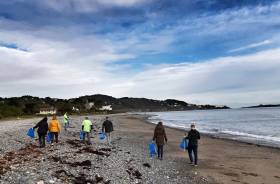Displaying items by tag: Ocean Health
The Ocean Race and Cabo Verde Will Team Up to Protect and Restore Ocean Health
Cabo Verde and The Ocean Race have signed a Memorandum of Understanding (MOU) that could see the island archipelago host stopovers and future meetings of The Ocean Race Summits in partnership with the iconic around the world sailing event.
The MOU would see The Ocean Race Summits — a congress of change-makers from across government, industry, NGOs and the scientific community — return to Cabo Verde, as well as the racing fleet during the next around the world races.
The arrangement was announced in New York on Monday (18 September) by Ulisses Correia e Silva, Prime Minister of Cabo Verde, who was participating in the latest The Ocean Race Summit by tabling a proposal to the General Assembly of the United Nations on Ocean Rights.
“Cabo Verde and The Ocean Race have established a special partnership through the signing of an MOU today. This collaboration is designed to promote the Rights of the Ocean, the Ocean Science programme, the blue economy and Cabo Verde as a tourist destination in water sports and eco-tourism,” the Prime Minister said at The Ocean Race Summit, as Cabo Verde leads the charge on this critical diplomatic path forward to restoring ocean health.
“In Cabo Verde we have a partner who is pushing forward at the leading edge of a movement and shares our vision that sport can play a role in protecting the ocean,” said Richard Brisius, race chairman of The Ocean Race.
“In January of this year we hosted a very successful edition of The Ocean Race Summit in Cabo Verde and together with Prime Minister Ulisses Correia e Silva, we welcomed UN Secretary-General Antonio Guterres to discuss the importance of Ocean Rights as a way to protect and restore health of the ocean.
 The Ocean Race Summits presents Ocean Rights in the United Nations Headquarters in New York on Monday 18 September. From left: Tania Romualdo, Permanent Representative of Cabo Verde to the UN; Ulisses Correia e Silva, Prime Minister of Cabo Verde; and Richard Brisius, race chairman of The Ocean Race | Credit: Cherie Bridges/The Ocean Race
The Ocean Race Summits presents Ocean Rights in the United Nations Headquarters in New York on Monday 18 September. From left: Tania Romualdo, Permanent Representative of Cabo Verde to the UN; Ulisses Correia e Silva, Prime Minister of Cabo Verde; and Richard Brisius, race chairman of The Ocean Race | Credit: Cherie Bridges/The Ocean Race
“This week we have taken another step on that journey with the introduction of Ocean Rights at the United Nations. This is the first step towards a Universal Declaration of Ocean Rights, in Cabo Verde, and in Prime Minister Ulisses Correia e Silva we have a steadfast partner to join us on this mission in a way that will benefit all stakeholders of the race.”
Working towards a Universal Declaration of Ocean Rights is part of The Ocean Race’s multi-award winning Racing with Purpose sustainability programme developed in collaboration with 11th Hour Racing, a premier partner of The Ocean Race.
The islands of Cabo Verde have long been a tactical landmark for sailors competing in The Ocean Race, who have historically needed to decide whether to weave between the islands, or to avoid the potential wind shadows by giving the archipelago a wide berth.
The 2023 race was the first time the race made a stop in Mindelo, Cabo Verde and the stopover was hailed as a great success, with over 70,000 visitors to Ocean Live Park and over 2,200 school children taking part at in-person educational workshops. The Ocean Race Summit in Mindelo had 344 participants and 40 international media covering the event.
The 14th edition of The Ocean Race finished in July in Genoa, Italy with 11th Hour Racing Team (USA) as the winning team. As part of a 10-year plan, the next two editions of the around the world race will take place in 2026-27 and 2030-31, while The Ocean Race Europe will take place in August-September of 2025 and again in 2029.
Wellbeing of Oceans Must be Seen as An Investment Priority
In what is a key variable in the fight against climate change, the world’s oceans cannot be a mere afterthought on the global economic and environmental agenda.
As the Irish Examiner reports, The Earth’s oceans face many threats, none of which have quick fixes. Still, the solutions are known, and with a sufficiently broad coalition of partners, we can get the ball rolling on a number of fronts.
A wide range of human activities — from burning fossil fuels to over-fishing — have been degrading the oceans for years. By increasing the absorption of carbon dioxide, global warming is acidifying the oceans and reducing oxygen levels, harming or killing marine plants, animals, and other organisms.
And as the ice caps melt, rising sea levels are putting hundreds of millions of people in coastal areas at risk.
Moreover, owing to a lack of modern treatment plants in many cities, especially in Africa and Asia, sewage is being dumped into rivers and canals, where it eventually runs off into the oceans, introducing large amounts of plastic particles and toxins.
The tonnes of rubbish dumped daily into streets, backyards, rivers, beaches, and coastal areas also end up in the oceans.
To read further click here and the European Investment Bank's Clean Oceans Initiative. In addition to Ireland's Clean Coasts which organises various programmes throughout the year.





























































